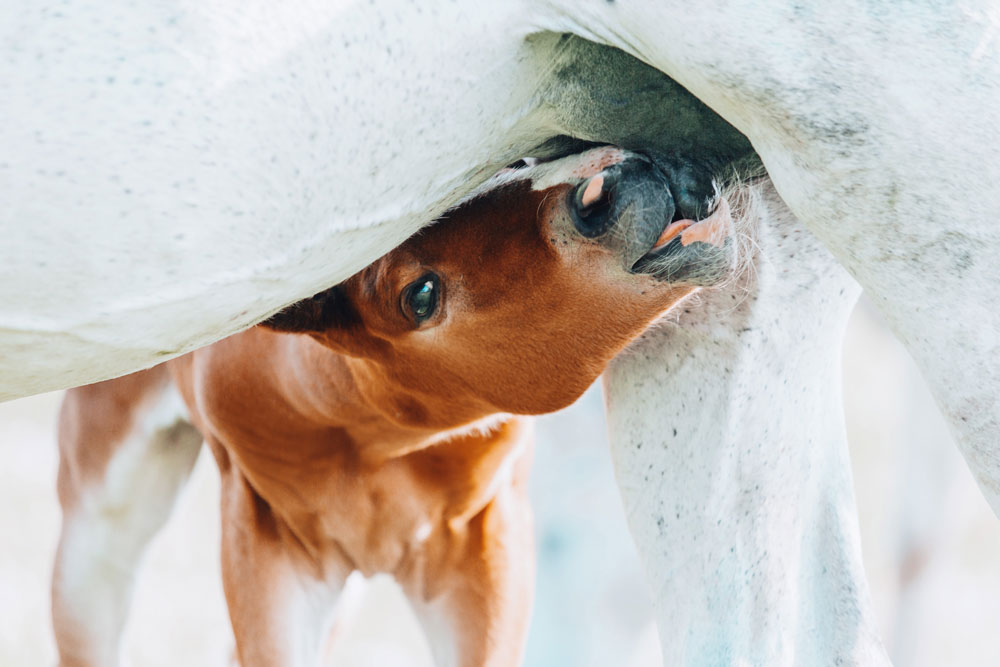If you’re the lucky owner of a winter-weight champion, the nose-to-tail weight evaluation in Part 2 (evaluating your horse’s body condition) of our series may have yielded little more than bonus time with your horse and a snapshot of your horse during every month of the year.
But if your measurements indicate a horse that’s losing weight during the winter months — or barely maintaining it — then stay tuned. There’s no magic weight-gain formula that works for every horse, but here’s what you can do to help your horse gain winter weight.
Schedule a Visit With Your Equine Dentist
As we discussed in Part 2 of this series, healthy teeth play a big role in proper digestion, absorption of nutrients, and weight maintenance. Horses’ teeth continue to grow throughout their lives, so while horses between ages 10 and 20 may only need annual dental work, book bi-annual teeth floating for youngsters, seniors, and horses in heavy work.
Worm Your Horse and Schedule a Fecal Exam
This is a no-brainer, but be sure you stay on top of de-worming your horses, and schedule a fecal exam every six months. Halloween and Easter are good dates for seasonal evaluations.
Rethink Your Grain Schedule
We’ve said it before, but the key to healthy digestion is small meals fed at regular intervals throughout the day. Horses need to eat constantly to maintain a healthy digestive system. Aim to feed three or four small meals per day instead of just one or two.
Provide Constant Access to Hay
Horses are hardwired to munch on small amounts of feed almost constantly. On average, a horse should ingest 1.5- to 2.5-percent of its body weight daily in forage. Not only is fiber-rich hay easily digested, it also provides additional heat during cold-weather months (and it keeps him happier in between meals).
Keep Your Horse Hydrated
Dehydration is a common cause of winter weight loss, so use a safe and effective water heater in your horse’s bucket or water trough. A cheap alternative for milder climates is to float a soccer ball or basketball in a trough to prevent icing over — but we prefer the heater. Remember that hay doesn’t have the same water content as green grass, so be sure to provide clean, ice-free water to make up for that change.
Slow Your Horse Down and Eliminate Stress at Feed Time
An empty belly will often provoke a horse to bolt its feed, but a stressful or intimidating environment will do the same. Eating too quickly gives starchy grains less time to be absorbed in the stomach and small intestine leading to poor nutrient absorption and problems in the hindgut. Avoid bolting by making sure your horse never gets too hungry, is fed in a safe environment without danger of barn mates stealing his food or causing him anxiety, and has ample time to eat. If he’s a habitual bolter, slow him down by adding chaff to his grain — the extra fiber won’t go amiss either!
Evaluate Your Horse’s Vital Stats
Is your horse older than 15? Switch to high-protein senior feed, which is more easily digested and will help him get the most nutritional benefit out of his feed.
Is your horse competing? If so, he needs many more calories than a horse that is exercised primarily during warmer months.
Is your horse outside during cold weather? Additional calories are needed to keep your horse warm — don’t let cold weather steal vital nutrients from his diet because he’s trying to stay warm.
Evaluate Your Horse’s Hay and Grain
Evaluating hay quality is as simple as requesting an analysis from your hay dealer. High-protein hay such as alfalfa or a mix of grass/timothy hay and alfalfa will provide additional calories. Each horse requires a different grain mixture, but a high-fat grain will add surplus calories, and can be supplemented with an add-in like vegetable oil, stabilized rice bran or ground flaxseed products.
Next Up: Start Preparing Now for Next Winter
If you’re utilizing these weight-gain tips for this winter, be sure to check out the final installment of the series to learn what you can do now to avoid playing catch up next winter.
Be sure to subscribe to the SUCCEED® blog or sign up for email notifications in the sidebar so you don’t miss Part 4: Start Preparing Now for Next Winter.



